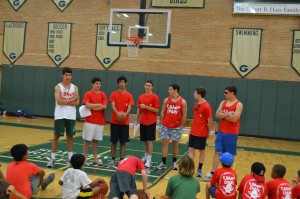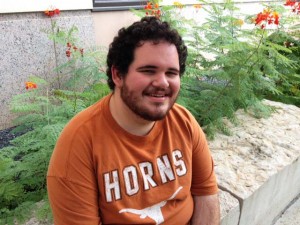You’ve seen it all in the news: the battle to go private, the fights with Carl Icahn, the many months of uncertainty and change. But what is it like on the front line at Dell company headquarters in Round Rock, Texas? How are employees managing their careers, implementing long-term strategies, and driving change in the business under such intense media scrutiny? Four UT alumni have volunteered to share their experience and advice with current BHP students.
 Scott Sanders – Executive Director and UT Recruiting Lead
Scott Sanders – Executive Director and UT Recruiting Lead
BBA Finance, ’91
Current Role: Scott is an Executive Director in the finance organization. He is a sales controller for US based large institutions, both private and public, including the University of Texas, Twitter, Facebook, and Starbucks.
This is an unusual time in Dell’s history- there is both opportunity and challenge. What would you say to students who are uncertain about recruiting based off what they read in the media?
Going private gives Dell the opportunity to regain the entrepreneurial spirit it may have lost along the way as a public company. Dell has always been a place of tremendous autonomy, but it will be even more so once we are able to make decisions based on what is best for Dell versus what we need to achieve our quarterly earnings calls. This transformation is a great time for students to build their resume by experiencing a once in a lifetime transaction. I have learned the most in my career during big company changes, like an acquisition, SEC investigation, and going private. Embrace the change as a learning experience and be reassured: Dell is as involved on campus as ever, and is still recruiting for the same positions.
What advice do you have for students currently looking for a job?
Cast a wide net when networking and differentiate yourself through leadership and your ability to negotiate and influence others. Make sure you learn about the jobs available at a company and the culture of the company and be sure to take location into consideration.
Dell is an ever-evolving company. Where would you like to see Dell go in the next few years and what are some of the goals you have for your team during this transformation process?
I want to see Dell become a trusted solutions provider. That will involve successful integration of all acquisitions and successful business case delivery for the Dell Software Group. The sales force must develop new capabilities to deal with the complexity of selling solutions and software. My vision for my team is for them to be thought leaders, trusted business advisors, business control experts, and to be constantly developing themselves.
 Angela Huang – Financial Development Program
Angela Huang – Financial Development Program
BHP/Finance, Minor in Actuarial Math, ’12
Current Role: Angela works in End User Computing Solutions supporting the Americas and Global 500 where she manages inventory and margin transparency.
What makes you excited to come to work each day?
Learning the intricacies of the business, checking out our new products, and being able to make a difference. The Financial Development Program forces you out of your comfort zone every 6 months, and I love that you can and ask tons of questions when you enter a new rotation. It gives me the opportunity to learn so much in a short amount of time.
What was the transition from UT to Dell like?
I think coming from UT makes the transition to Dell much easier than if I were coming from another university outside of Texas because I know the city and I already have connections. In terms of transitioning from a student to a full-time employee, it really helped that McCombs required an internship, which exposed me to what having a full-time job is like. I still go to sleep much later than I should… that’s the one thing I still haven’t transitioned from.
What aspects of BHP have helped you the most in your career?
– Team projects. I’m constantly working with other people in my job, and having been through so many team projects with BHP has helped me be able to communicate more effectively and to lead a project.
– Case studies. I used to groan about reading and discussing case studies, but it really has helped me organize my thoughts and understand how companies run as a whole, as well as why their strategy works or does not work.
– Being surrounded by high achievers. Dell is full of highly motivated individuals whom I admire. It pushes me to work harder and be better, which is very similar to the BHP environment.
 David Kuo – Financial Development Program
David Kuo – Financial Development Program
BHP/Finance, ’12
Current Role: David works as a financial analyst in Corporate Strategy, an internal strategic consulting team. The team tackles issues and opportunities defined by the CEO’s office and the Executive Leadership Team. It leads cross-company teams, delivers insights, provides actionable/practical recommendations, and drives implementation to transform Dell.
How do you manage all of the change in the industry and the company as it is looking to go private?
The go-private transaction really hasn’t affected my day-to-day activities. Whether the firm is publically traded or private hasn’t impacted my responsibilities, which include providing timely research, analysis, and recommendations on Corporate Strategy projects. Additionally, the leadership team has committed to continuing to invest in our young talent via our development programs.
What is the most rewarding part of your job?
The most rewarding part of my job has been the diverse sets of experience I’ve received from the Financial Development Program (FDP). I’ve worked in the External Reporting team, where I helped prepare the 10-K/Q for filing at the SEC, and the Software and Peripherals Finance team, where I supported FP&A and business processes. I recently joined the Corporate Strategy team and am looking forward to future experiences at the company.
Why Dell? What does Dell offer new college graduates?
Dell offers the opportunity to interact with other top graduates from around the world. You will start with a class from varying backgrounds, rotate through diverse roles, and have the opportunity to work internationally on a merit-basis. Throughout this time, you will grow personally and professionally from your experiences with each other, all while developing a world-class network.
 Brent Lovett – Commercial Services Group
Brent Lovett – Commercial Services Group
BHP/MIS, ’13
Current Role: Brent works in Platform Engineering Solutions Delivery in the Dell Commercial Services Group- Site Operations. Brent supports platforms for all Dell.com non-production environments.
What is your favorite thing about working for Dell?
My favorite thing about working for Dell is the different technologies that I get to work with in my job. Thanks to the size and reach of our company, I get to use tools on a day-to-day basis that others in my industry only get to dream about using. It makes for work that is a lot of fun!
What surprised you the most about working for Dell?
I think what surprised me most was how tight a community my group at Dell has. Coming into the organization, I was afraid that I would just be one of many, but I have found that quite the opposite has occurred. Dell is truly made up of a bunch of smaller “families,” and my DCSG family has gone out of its way to welcome and include me.
Describe your favorite project.
My favorite work item so far has been assisting with how our new business group, the Dell Commerce Services Group, should operate from a platform engineering prospective. I’ve had the opportunity to help design our new platform environment which is something that a lot of 22 year-olds in my area don’t get to experience.
What advice do you have for students recruiting with Dell?
Come join us! A lot of times Dell is somewhat forgotten, particularly with MIS majors, but our trajectory is moving in the path of other big companies like Google, Microsoft, and Amazon. Our culture is moving in that direction as well. Plus, who wouldn’t want to stay in Austin?
Connect with us: @CareersAtDell, @DellFDP, linkedin.com/company/dell/careers, Facebook.com/delluniversityrelations, dell.com/careers.







